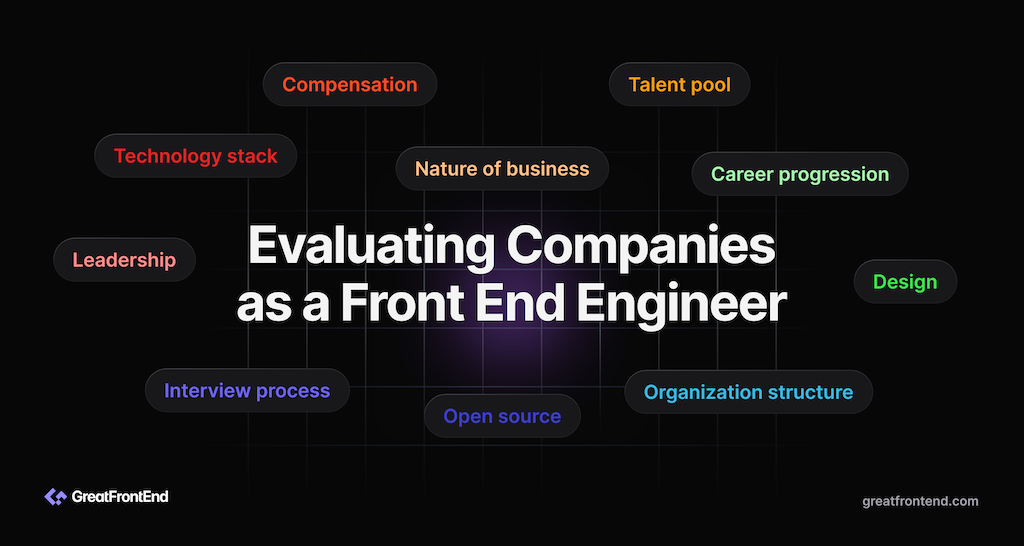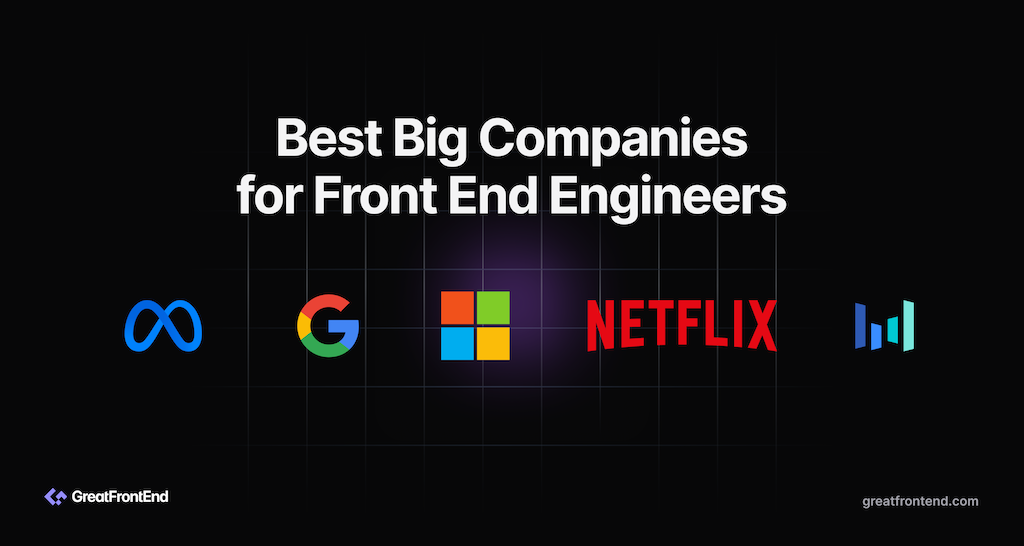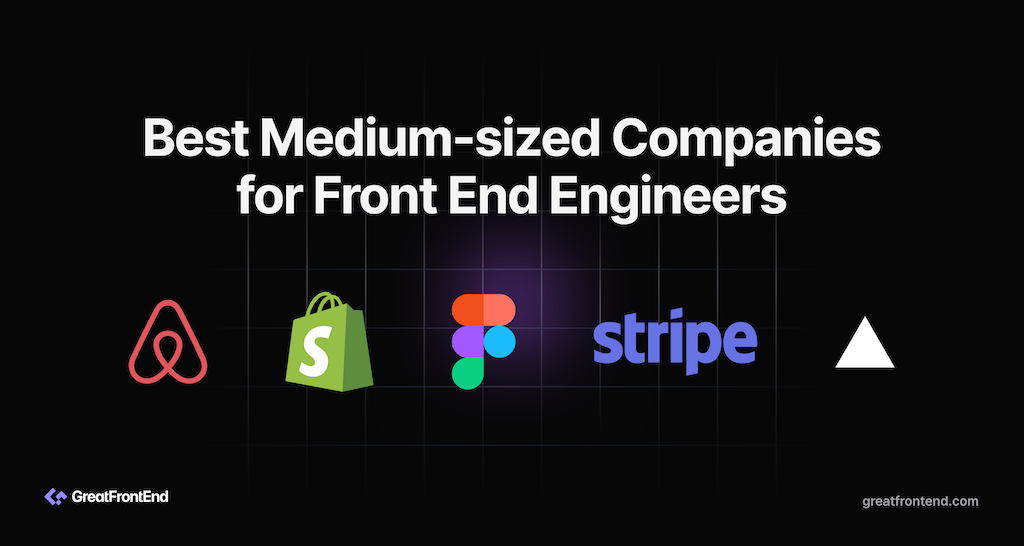How to Evaluate Companies as a Front End Engineer
Learn the key factors and essential questions that Front End Engineers should explore when evaluating companies.
Front End Engineering is a nuanced field within Software Engineering and not all companies place equal emphasis on nor have the need for. Choosing the right company is a pivotal decision that can shape the trajectory of a Front End Engineer's career.
A careful evaluation of potential employers to ensure alignment with one's skills, aspirations, and work preferences. From the nature of business to technological stack to growth opportunities, the considerations are diverse and significant. In this post, we highlight key factors and essential questions that Front End Engineers should explore when evaluating companies. By delving into these factors, Front End Engineers can make informed decisions that not only resonate with their expertise but also contribute to a fulfilling and successful career.
Here are some of the factors you should be considering when joining a company as a Front End Engineer:
- Nature of business
- Technology stack / Engineering practices
- Organization structure
- Leadership
- Interview process
- Compensation
- Career progression
- Talent pool
- Open source & community contributions
- Focus on design
Let's dive into each factor.
Nature of business
How important is the front end web product to the success of the company? Is web the primary medium in which users consume the product or is web just used for internal dashboards?
If front end web is important to the company, the company will likely want to hire the best front end engineering talent and compensate them well. As a Front End Engineer, it's also important to join such companies because if/when recession strikes, the less important departments will be the first to be let go. Ideally, you'd want to be in the important departments, be it recession or not.
Web engineering is important to companies like Figma where the core product is within the browser or a native desktop app. On the other hand, web is not as important to a ridehailing company where users are using native mobile apps to book rides.
What are the primary revenue streams for the business? What is the breakdown of revenue per platform?
It goes without saying that companies will allocate more resources to revenue-generating platforms.
Other questions to ask:
- Are there specific metrics used to measure the success of front end initiatives?
- Describe the unique business challenges the front end team faces within your industry?
- What is your target market and how do you plan to expand it? What devices do these markets use to consume the application/services?
- How do you see the industry evolving in the next few years, and where do you see the company within that context?
Technology stack / Engineering practices
What technology stack is the company on? Does the company bother to keep up with modern front end technologies or are the company's products still on jQuery and Bootstrap 3 with no intention to migrate?
You don't want to be still working on legacy technologies and not improve your skills at your new job. A stack that includes modern front-end technologies can offer more relevant experience and contribute to your professional growth.
Good companies should strive to keep their technologies updated as it improves the product quality and helps their employees stay relevant with industry needs.
What are scalability and performance challenges the company has faced? Describe the technical challenges faced by the front end teams.
If the technical challenges/bottlenecks are mainly on the back end, then back end is likely more important to the company than front end in the long run. Consequently, there will be more seniority composition of engineers will bias towards the back end and limited growth for front end engineers due to lack of complex front end work available.
What is your approach to front end testing and quality assurance?
If front end products are not tested thoroughly, the company is either small, or the front end products are not as important.
Other questions to ask:
- Can you describe the current technology stack and why it was chosen?
- How does the technology stack support the company's goals and objectives?
- Are there any plans to adopt new technologies or tools in the near future?
- How do you handle technical debt and ensure the codebase remains maintainable?
- Can you discuss the deployment process and how frequently deployments occur?
Organization structure
How are engineering teams organized? Are there both front end engineers and back end engineers in the same team or are they in separate teams? How much back end engineering does a front end engineer have to do?
Both ways of team organization can work, but you'd want to avoid a situation where you are the only front end engineer on a large team primarily made up of back end engineers where there are few senior to learn front end from. You might also be a victim of "bait and switch", where after you join a team, there isn't that much front end work to do and you end up spending most of your time doing back end work. That's not what you're hired to do in the first place, some might like it, but most don't.
Is there a front end infrastructure team that takes care of common front end engineering needs across the company such as design system components, linting, build, performance, package upgrades, etc?
If a medium/large-sized company does not have a dedicated front end infrastructure team, there is a good chance that the company does not have too many front end products to warrant the need for a front end infrastructure team. Another reason is that front end engineering quality is not important to the company.
Other questions to ask:
- How are engineering teams organized within the company?
- Can you describe the reporting and collaboration structure for the front end team?
- What is the ratio of front end engineers to other engineering roles?
- How does the front end team collaborate with product managers and stakeholders?
- Are there cross-functional teams that include front end engineers, and how do they operate?
- What opportunities are there for front end engineers to lead projects or initiatives?
- How are front end tasks and projects prioritized within the organization?
Leadership
How much does leadership value front end engineering? How important is brand identity and design to the company?
The former can be hard to find out as an outsider but you can roughly tell from the quality and aesthetics of the products. This is an important question to find out because leadership decides where to allocate resources to and the more important departments have a higher priority.
What is the background of the leaders (especially the technical ones)?
Leaders that were more product and design focused will tend to prioritize front end engineering quality.
Other questions to ask:
- How involved is the leadership team in front end engineering decisions?
- What is the leadership's vision for the front end team's growth and development?
- How are successes and achievements within the front end team recognized by leadership?
- What qualities do you look for in leaders within the front end team?
Interview process
Is there a dedicated front end interview process or is the process the same as for general software engineers (back end heavy)?
A dedicated front end interview process allows companies to assess candidates more thoroughly and accurately for front end engineering roles. It ensures that the evaluation is aligned with the specific skills and challenges associated with front end development, contributing to effective hiring decisions and the overall success of the engineering team.
If there isn't a dedicated front end interview process, it could be a sign that leadership does not understand front end engineering well and there's no front end engineers in leadership roles. A front end interview process that does not test the right skills can result in non-optimal hires which brings down the company's quality of front end engineering.
Other questions to ask:
- Can you describe the typical interview process for a front end engineer role?
- What kind of front end coding challenges or technical assessments can I expect?
- How do you evaluate front end skills such as HTML, CSS, JavaScript, and frameworks?
- Who will I be meeting with during the front end interview stages?
Compensation
Does the company pay front end engineers the same as back end / full stack / generalist software engineers?
If a company pays different specializations of software engineering differently, it's an indication that some specializations are not as important as the rest, aka. Second class citizens. Many companies like Meta and Google pay Front End Engineers as much as Software Engineers. Don't settle for less.
Even if companies pay the same salary for Front End Engineers, the offer salary shouldn't be the only factor you should consider. You should also consider the longer term aspects such as career progression, how feasible it is possible to grow to senior, staff levels and beyond.
Career progression
How does the career ladder for a front end engineer differ from a back end engineer? How high is the career ceiling for a front end engineer at the company? What level can you attain by focusing on front end development? What is the composition of backgrounds of the high-level engineers at the company?
The career ladder for a front end engineer and a back end engineer can vary between companies, and the specific titles and levels may differ. The career ceiling for a front end engineer can be quite high in companies that have complex client products (e.g. Figma, Google Docs, VS Code, etc) or value the importance of user experience and interface design.
In many other companies, the career ceiling for front end engineers is much lower. For such companies, front end engineers have to look beyond front end work and contribute strategically to the organization's goals in order to rise up the ranks.
Companies which have high career ceilings for Front End Engineers (without them having to go into management) include Google, Meta, Microsoft, Airbnb, and Figma.
As mentioned earlier, look out for where the technical challenges lie as the company grows. Complex front end technical challenges will warrant the need for senior and beyond front end engineers which is good for a career in front end engineering.
Talent pool
How many other front end engineers are there at the company? Who are the other front end engineers at the company? Are they experienced and people I can learn from to level up my front end engineering skills? Are the other front end engineers also passionate about modern front end technologies and frequently share knowledge with each other?
Understanding the experience level of fellow front end engineers is crucial for evaluating potential learning and mentorship opportunities. Working alongside experienced peers facilitates skill development, as you can glean insights from their expertise and real-world projects.
It's also important to know if there's a culture for sharing about modern front end technologies; A team that actively shares knowledge and embraces modern technologies suggests a dynamic and forward-thinking environment.
Other questions to ask:
- How would you describe the current team of front end engineers at the company?
- What qualities do you look for when hiring new front end engineers?
- What is the seniority breakdown of front end engineers at the company?
Open source & community contributions.
Does the company have any open source projects? Does the company give back to open source by submitting upstream projects? Does the company have an engineering or design blog and their posts of high quality?
Having a community presence contributes to the positive brand image of the company and demonstrates a commitment to transparency, collaboration, and giving back to the community. An engineering blog fosters a culture of knowledge sharing within the company and contributes to the professional development of team members.
A company actively involved in open source contributions is likely to attract developers who are passionate about open source and community collaboration. It can be a deciding factor for top talent when choosing where to work.
Being able to contribute to open source (be it the company's open source projects or projects used by the company)as part of your work helps to build up personal brand and credibility which is useful to show future employers.
Other questions to ask:
- Does the company contribute to any open source projects related to front end development?
- Are software engineers encouraged to contribute to open source during work hours?
- Discuss any notable front end open source contributions made by the company or its employees?
- How does the company recognize and reward open source contributions from engineers?
Focus on design
Are the company's products visually appealing? Is there a cohesive brand identity and product interface? Do the products look like they are part of a design system?
While Front End Engineers don't necessarily have to design, they have to work closely with designers and implement what the designers come up with. A design system provides a structured approach to design and development, promoting consistency, efficiency, and collaboration across teams. It is an essential tool for creating and maintaining a unified and user-friendly interface in software products. Building products without a proper design system will lead to inefficiencies and inconsistencies down the road. A lack of a proper design system or design department could also be an indication that design and front end engineering is not valued by the company.
Other questions to ask:
- How is design and brand aligned across the products on the different platforms?
- Is there a brand / design system team in-charge of the company's brand and design system?
- Describe the relationship between the front end engineering and design teams?
- How does the company ensure a consistent design language across all front end projects?
- What design tools and methodologies do front end engineers use?
- How do the company measure the success of the front end design efforts?
Evaluating a company holistically, from its tech stack to its commitment to innovation and the quality of its team, empowers you to make informed choices that align with your professional aspirations.
By considering the factors outlined in this guide, you pave the way for a rewarding and fulfilling career, where your skills thrive, and your contributions leave a lasting impact on the digital experiences you help create.
You are not just choosing a workplace; you are selecting a path that leads to your own advancement, innovation, and success as a Front End Engineer.
Related articles

 Discover the best medium-sized tech companies for a great career as a Front End Engineer.
Discover the best medium-sized tech companies for a great career as a Front End Engineer.